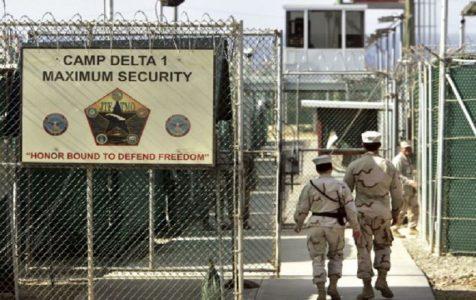
Uruguay probing whether ex-Guantanamo detainee has links to the Islamic State terrorist group
Police in Uruguay are investigating whether a former Guantanamo detainee who was granted refuge there is a member of the extremist Islamic State group.
The alleged militant is a Syrian national named Abu Wa’el Dhiab, also known as Jihad Diyab, released in 2014 from the controversial U.S. prison at Guantanamo Bay, Cuba. His accuser — who Dhiab claims owes him thousands of dollars — is Omar Khader Attalla, a Palestinian-born merchant. Both men live in Rivera, a department in northern Uruguay near Brazil.
Authorities began investigating last month, after the men filed complaints against each other.
Dhiab was among six detainees transferred from Guantanamo to Uruguay for resettlement in 2014. The six — mostly Syrians like Dhiab, plus a Tunisian and a Palestinian — had been held since 2002 for suspected ties to the jihadi group al-Qaida but never were charged.
Dhiab, who was force-fed to break a hunger strike while at Guantanamo, repeatedly has sought transfer to an Arab country. Since his release in Montevideo, he has traveled to neighboring Argentina and Brazil, as well as Venezuela and Morocco, raising questions about oversight.
Last July, Dhiab was apprehended at Morocco’s airport and deported for carrying a fake Tunisian passport, as the Associated Press reported then. In 2016, he turned up at the Syrian consulate in the Venezuelan capital, Caracas, before he was sent back to Uruguay. Uruguay’s foreign ministry said at the time that Dhiab’s refugee status allowed him to leave the country.
The United States won’t transfer a Guantanamo detainee without “appropriate security measures,” Pentagon spokeswoman Sarah Higgins told VOA.
“The United States coordinates with the receiving country regarding appropriate security measures and to ensure that these transfers are consistent with our humane treatment policy,” Higgins, a Navy commander, said Friday from Guantanamo, where she was visiting.
“It is a different arrangement depending on the receiving country; there are no standard guidelines. Until a country agrees to provide appropriate security measures and to treat the detainee humanely, we will not transfer the detainee to that country,” she said.
But a former U.S. State Department security official told VOA last week that the hundreds of released Guantanamo detainees receive minimal oversight. “Their supervision is largely left at the discretion of local authorities,” said the official, who asked to remain anonymous because he still conducts sensitive work for the department.
Of 714 detainees released or transferred from Guantanamo, beginning with President George W. Bush’s administration, almost 17 percent — or 121 individuals — were “confirmed of re-engaging” in terrorist activities, the National Intelligence director’s office reported last March. Another 12 percent — or 87 — were suspected of doing so.
Source: VOA





